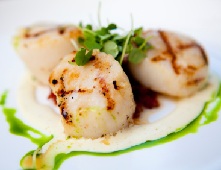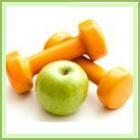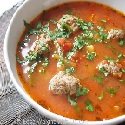Lose Weight
![]() Calories in Food
Calories in Food
![]() Calories in Seafood
Calories in Seafood
![]() Calories in Scallops
Calories in Scallops
Calories in Scallops,
Scallop Nutrition Facts
How many calories in Scallops? We provide you with the Scallop calories for the different serving sizes, Scallop nutrition facts and the health benefits of Scallops to help you lose weight and eat a healthy diet.
Scallops are shellfish, commonly served in their pretty fan shaped shell. They have a lovely white meaty flesh. Some would argue that the best Scallops come from Bantry Bay in Ireland where the shells are six inches wide and they taste deliciously sweet.
Try grilling with them still in their shells, sautéing Scallops in some olive oil or steaming. Scallops provide a good source of vitamins B1-B3, B5, B6, B12, magnesium, phosphorus, potassium and selenium, as well as other vitamins and minerals. They are low in fat and provide a good amount of protein.

Scallops contain omega-3 fatty acids and are therefore thought to help lower blood pressure and give added protection against cardiovascular diseases. Other Scallop benefits are believed to include reduced risk from the development of Alzheimer’s disease.
Compare calories in Scallops with the other calories in seafood.
Mollusks, Scallop, Mixed Species, Raw
Refuse: 0%Scientific Name: Pectinidae
| Serving Size | Calories per Serving |
| 100 grams | 69 kcal (289 kJ) |
| 1 unit 2 large or 5 small, 30 grams | 21 kcal (87 kJ) |
| 3 oz, 85 grams | 59 kcal (246 kJ) |
Calories in Scallop, (Bay and Sea), Cooked, Steamed
Refuse: 0%| Serving Size | Calories per Serving |
| 100 grams | 111 kcal (466 kJ) |
Mollusks, Scallop, Mixed Species, Cooked, Breaded and Fried
Refuse: 0%| Serving Size | Calories per Serving |
| 100 grams | 216 kcal (902 kJ) |
| 2 large, 31 grams | 67 kcal (280 kJ) |
Scallop Nutritional Information
| Nutritional value per 100 g (3.5 oz) | |
|---|---|
| Proximates: | |
| Water | 70.25 g |
| Energy | 466 kJ (111 kcal) |
| Protein | 20.54 g |
| Carbohydrates | 5.41 g |
| Total Fat: | 0.84 g |
| saturated fat | 0.218 g |
| monounsaturated fat | 0.082 g |
| polyunsaturated fat | 0.222 g |
| Cholesterol | 41 mg (14 %) |
| Minerals: | |
| Calcium, Ca | 10 mg (1 %) |
| Iron, Fe | 0.58 mg (3 %) |
| Magnesium, Mg | 37 mg (9 %) |
| Phosphorus, P | 426 mg (43 %) |
| Potassium, K | 314 mg (7 %) |
| Sodium, Na* | 667 mg (29 %) |
| Zinc, Zn | 1.55 mg (10 %) |
| Copper, Cu | 0.033 mg (1.65 %) |
| Manganese, Mn | 0.029 mg (1.5 %) |
| Selenium, Se | 21.7 mcg (31 %) |
| Vitamins: | |
| Thiamine (Vit. B1) | 0.012 mg (1 %) |
| Riboflavin (Vit. B2) | 0.024 mg (1.4 %) |
| Niacin (Vit. B3) | 1.076 mg (5.4 %) |
| Pantothenic acid (B5) | 0.366 mg (4 %) |
| Vitamin B6 | 0.112 mg (6 %) |
| Folate (Vit. B9) | 20 mcg (5 %) |
| Vitamin B12 | 2.15 mcg (36 %) |
| Vitamin A | 5 IU (0.1 %) |
| Vitamin D | 2 IU (0.5 %) |
| Percentages are relative to US Recommended Daily Intake (RDI) for adults. | |
* Samples were obtained from 12 retail stores using a probability-based sampling plan. Some fish had been treated during processing to retain moisture on thawing. Untreated fish = 112 mg sodium/100g.
Source: USDA National Nutrient Database for Standard Reference
You Might Also Like:
Like This Page?
|
Share This Page:
|
Search Our Site:

Free E-Book:
We Recommend:
Looking to get your body into great shape? Get the very best results for your efforts and money! Save your valuable time from surfing the internet. These are theBestselling Weight Loss Programs

Programs that work and have thousands of satisfied customers worldwide!

 |




